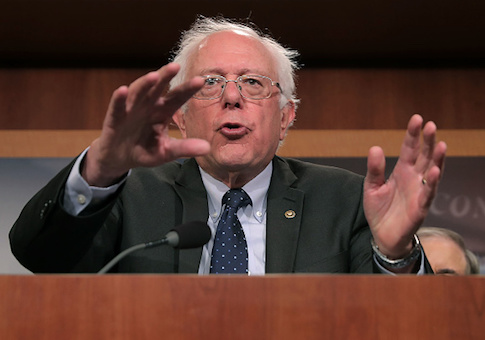Sen. Bernie Sanders has lent his support to the unionization efforts of graduate students at the University of Chicago, as labor activists at his alma mater say the administration has been throwing up roadblocks ahead of a vote on the issue.
Sanders wrote in a letter to Graduate Students United "it is not my intention to tell you how to vote" in the union elections, scheduled to take place over Tuesday and Wednesday, before going on to voice his support for labor advocates who face off with employers who want to make "all the decisions unilaterally."
"What forming a union means is that you and your co-workers will have the opportunity to sit down as legal equals with management to negotiate a legally binding contract covering all aspects of your wages, benefits, and working conditions," wrote Sanders.
The Vermont senator and former Democratic presidential candidate wrote, "Nationally, unionized workers make wages that are on average 27 percent more than non-union workers, with significantly better benefits and working conditions."
"I respect the critical work you do every day, and wish you the very best in your efforts to create a democratic workplace where your voice can really be heard," he added.
GSU has been working since 2007 to get a union for teachers and research assistants at the University of Chicago. The group, which is made up of about 2,500 TAs and lecturers, has lobbied for pay increases and more child-care options, but this week would be the first-ever union vote.
The National Labor Relations Board ruled in August 2016 that TAs and RAs at private universities have the right to unionize under the National Labor Relations Act.
That decision gave new life to what was previously a widely disregarded collective bargaining movement at private institutions of higher learning, including campaigns by the American Federation of Teachers at Northwestern, Princeton, Cornell, and Brown.
University administrators at the University of Chicago and elsewhere have raised concerns that unionization could introduce detrimental third-party interference into the graduate student experience, including potentially harming students' relationships with their faculty mentors. Administrators have worried that a union might weigh in on scholarship, a potential impediment to academic freedom; compel all graduate students to register; and require members to pay dues, piling on an additional expense to already money-strapped graduate students.
Universities have also worried that unionized TAs would be expected to participate in any strikes that occur, leaving undergraduate classrooms suddenly abandoned.
A 2013 study out of the Cornell University School of Hotel Administration dismissed many of these anxieties and called on administrators not to deny labor rights to their student employees.
Some labor advocates, who found an ally in the Obama administration, have said universities are delaying votes on the union issue to give the newly Republican majority NLRB time to overturn last year's decision, which was itself a reversal from a Bush-era ruling.
The board's political breakdown, and presumably its stance on unions, flipped when the Senate confirmed President Donald Trump's two nominees in August and September.
The university filed a motion late last month to stay the election or impound the ballots, explaining it is likely this new NLRB will issue rulings that would invalidate the graduate students' original request to unionize. Graduate Students United say the university has provided "no justification" for its case so the election should proceed as scheduled.
Nearly 100 faculty members signed a letter to the editor published in the student paper calling on the administration to uphold "its commitment to freedom of expression" and allow the vote to go ahead as scheduled.
Noam Chomsky, the renowned linguist at Massachusetts Institute of Technology, and author Alice Walker—both high profile advocates of left-wing politics—have also issued statements of support for the GSU.
The GSU have written on social media that administrators are looking to complicate and taint the election process by assigning students to voting centers alphabetically, with locations spread across the urban campus.
"If your last name starts with and [sic] unpronounceable outer space glyph, you vote at a secret location under Mansueto. The video is classified," the group tweeted, referring to the university library.
